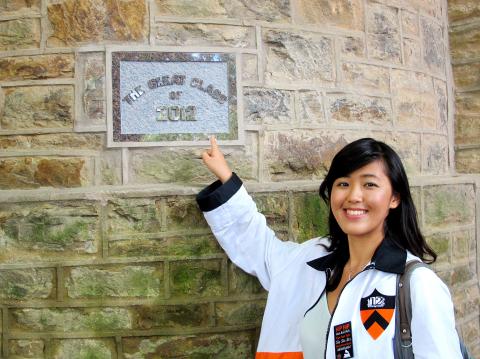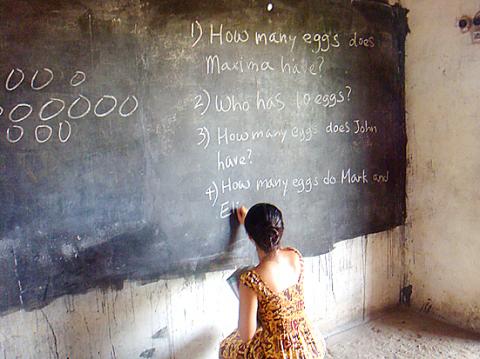Liu An-ting (劉安婷) first came under the public spotlight when she was 18 years old. Motivated by a desire to read the Harry Potter books, Liu mastered English, applied to Princeton and — to her own astonishment — was accepted with financial aid.
Liu was billed as the pride of Greater Taichung, though in reality she was happy to leave.
“Five years ago I was running away, really, from Taiwan or the education system that I thought was way too limiting … I thought the system was suffocating my creativity,” Liu, 23, says.

Photo courtesy of Liu An-ting
“At Princeton, I never even marginally thought about returning. I thought if I could make it there, I would stay there.”
Liu has spent four of the past five years completing her degree in international affairs, and the past year working as a management consultant at a top-tier New York City firm. During the summers, she lived in Haiti and Ghana, teaching at rural schools.
But two weeks ago, she returned to Taiwan, possibly for good.

Photo courtesy of Liu An-ting
“I went to all these countries, Ghana, Haiti, Cambodia — where I did research — and there were issues like poverty that are present in Taiwan,” Liu says.
“I saw that I can care about these issues, work on these issues — but that I could never be as intimate with these issues as the locals. I saw myself as more of a burden than any help, because they had to take care of me. They had to embrace my foreignness,” she says.
“At the end of the day, I believed that if Africa will be revived, it has to be revived by its own young people. And then I thought, what does that mean for me?”
Last month, Liu resigned from the consulting position, her first job. After flying back to Taipei, she formally launched Teach for Taiwan (為臺灣而教), the culmination of a year-long research project with National Chengchi University.
THE PROGRAM
Teach for Taiwan is aimed at resolving a paradox, Liu says.
When hiring teachers, administrators at elementary schools give priority to nationally licensed teachers, but can also legally hire college graduates with an education-related major, teaching experience or simply a diploma, in that order. “Yet even with such a low bar, rural schools in Taiwan are not able to find enough teachers,” Liu says.
“That’s an incredible fact, because these are well-paid jobs, and the demand for well-paid jobs is there.”
Next year, the non-profit organization expects to start placing graduates from high-powered Taiwanese universities into under-serviced public-school classrooms. Teach for Taiwan doesn’t generate the jobs, but acts as a bridge between the graduates and vacant positions.
“As an organization, we don’t pay their salaries — the salary is already there. The base salary is NT$30,000 [per month], and with most of these schools, you get an extra stipend because you are far away,” Liu says.
FAMOUS BRETHREN
If final negotiations go well next month, Teach for Taiwan will become the newest affiliate of Teach for All, the international organization that includes Teach for America.
Since 1989, Teach for America and its famously low acceptance rate have given teaching in far-flung schools a newfound prestige. But the program has also courted criticism from those who think its training is not enough to prepare young people for the challenges that await them in rural and urban classrooms — challenges that include the resentment of local teachers.
“The recruit comes from Harvard, and he’s got prestigious training, and he thinks he knows what the community needs,” Liu says. “Maybe he does know, but he needs to get to know the community before he can help them.”
Liu and a team of professors and other twenty-somethings have compiled dozens of case studies on the Teach for America program that have gone wrong, trying to design a training course that can preclude the major pitfalls.
“We were very insecure over these criticisms [on Teach for America], and concerned that we would be doing more harm than good,” Liu says.
“We’ve identified the recruit’s attitude and community contacts as huge factors that determine success. A main focus of our program will be to teach fellows about the specific community they will be teaching in, and those things will be taught by the community members and people who have [taught in those schools],” Liu says.
“That’s hard for Teach for America, because America is big. In Taiwan, it’s not as difficult,” she said.
Teach for Taiwan begins recruiting its first class in February. It will start small, sending teachers into just one community to ensure quality, and then scale up. “We’ll probably start with the east, since that is the first region we researched and where we have the most connections,” Liu says.
The first cohort of fellows will also be small, capped at 15 graduates from Taiwanese universities.
For more information about eligibility, visit www.teach4taiwan.org.

June 23 to June 29 After capturing the walled city of Hsinchu on June 22, 1895, the Japanese hoped to quickly push south and seize control of Taiwan’s entire west coast — but their advance was stalled for more than a month. Not only did local Hakka fighters continue to cause them headaches, resistance forces even attempted to retake the city three times. “We had planned to occupy Anping (Tainan) and Takao (Kaohsiung) as soon as possible, but ever since we took Hsinchu, nearby bandits proclaiming to be ‘righteous people’ (義民) have been destroying train tracks and electrical cables, and gathering in villages

This year will go down in the history books. Taiwan faces enormous turmoil and uncertainty in the coming months. Which political parties are in a good position to handle big changes? All of the main parties are beset with challenges. Taking stock, this column examined the Taiwan People’s Party (TPP) (“Huang Kuo-chang’s choking the life out of the TPP,” May 28, page 12), the Democratic Progressive Party (DPP) (“Challenges amid choppy waters for the DPP,” June 14, page 12) and the Chinese Nationalist Party (KMT) (“KMT struggles to seize opportunities as ‘interesting times’ loom,” June 20, page 11). Times like these can

Dr. Y. Tony Yang, Associate Dean of Health Policy and Population Science at George Washington University, argued last week in a piece for the Taipei Times about former president Ma Ying-jeou (馬英九) leading a student delegation to the People’s Republic of China (PRC) that, “The real question is not whether Ma’s visit helps or hurts Taiwan — it is why Taiwan lacks a sophisticated, multi-track approach to one of the most complex geopolitical relationships in the world” (“Ma’s Visit, DPP’s Blind Spot,” June 18, page 8). Yang contends that the Democratic Progressive Party (DPP) has a blind spot: “By treating any

Swooping low over the banks of a Nile River tributary, an aid flight run by retired American military officers released a stream of food-stuffed sacks over a town emptied by fighting in South Sudan, a country wracked by conflict. Last week’s air drop was the latest in a controversial development — private contracting firms led by former US intelligence officers and military veterans delivering aid to some of the world’s deadliest conflict zones, in operations organized with governments that are combatants in the conflicts. The moves are roiling the global aid community, which warns of a more militarized, politicized and profit-seeking trend